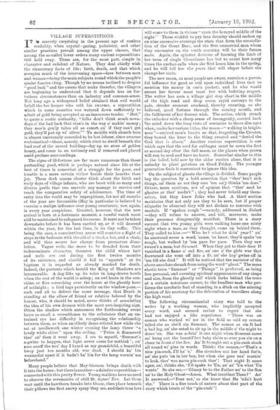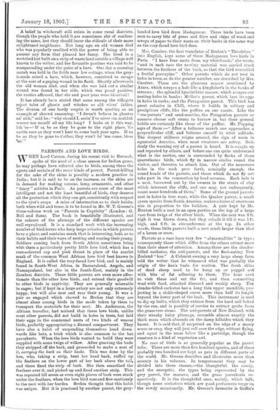VILLAGE SUPERSTITIONS.
IT is scarcely surprising in the present age of restless credulity, when crystal - gazing, palmistry, and other similar practices prevail among the upper classes, that among the so-called lower orders many ancient superstitions still hold sway. These are, for the most part, simple in character and redolent of Nature. They deal chiefly with the elementary facts of life: birth, death, and that which occupies much of the intervening space—love between man and woman—being the main subjects round which the people's quaint fancies cling. Though by no means inclined to despise "good luck" and the omens that make therefor, the villagers are beginning to understand that it depends less on for- tuitous circumstances than on industry and common-sense. Not long ago a widespread belief obtained that evil would befall the bee keeper who sold his swarms, a superstition which in some counties was watered down sufficiently to admit of gold being accepted as an innocuous tender. "But," to quote a rustic authority, "folks don't think much nowa- days o' the bad luck that stan's in the way o' makin' money ; they mos'n genly takes all as comes, an' if they can't get gold, they'll put up wi' silver." To meddle with church bees is almost universally conceded to be lost labour, since swarms ecclesiastical—those, namely, which elect to dwell beneath the lead roof of the sacred building—lay up no store of golden honey, and come to an untimely end if removed and placed amid profane surroundings.
The signs of ill-fortune are far more numerous than those portending good, which is perhaps natural since life at the best of times is somewhat of a struggle for the poor, and trouble is a more certain visitor beside their hearths than joy. These dark omens cluster thick about the birth and early days of village infants, who are beset with so many and diverse perils that one marvels any manage to survive and reach the comparative safety of adolescence. The time of entry into the world may be unpropitious, for not all months of the year are favourable (May in particular is believed to exercise a malign influence over young creatures); nor, again, is every year auspicious. Granted, however, that the new arrival is born at a fortunate moment, a careful watch must still be maintained to safeguard its career. It must not be taken downstairs before it has been carried up, or it will descend within the year, for the last time, in its tiny coffin. This being the case, a conscientious nurse will contrive a flight of steps in the bedroom with the aid of a stool, a box, and a chair, and will thus secure her charge from premature disso- lution. Vague evils, the more to be dreaded from their indeterminate character, threaten the child whose hair and nails are cut during the first twelve months of its existence, and should it fail to " squatch " at its baptism it is regarded as already marked for death. Indeed, the portents which herald the King of Shadows are innumerable. A dog lifts up its voice in long-drawn howls when the rest of the world is asleep; an owl hoots in the sun- shine, or flies screeching over the house at the ghostly hour of midnight ; a bird taps persistently on the window-pane,- each and all to deliver the same message, that Death is standing at the elbow of friend or relative beloved by the hearer, who, it should be noted, never thinks of associating the idea of his own decease with the most awe-inspiring sign. Often the shadow which announces the forthcoming event bears so small a resemblance to the substance that an un- trained eye has difficulty in recognising the relationship between them, as when an elderly dame related how while she sat at needlework one winter evening the lamp threw "a lovely white shine upon the ceiling. "Twice it flimmered thee an' then it went away. I sez to myself, • Summat's a-gwine to happen, that light never come for nothink ' ; an' sure anuff the nex' day I heard as my grandchild, a beautiful bwoy just ten months old, war dead. I should ha' bin wunnerful upset if it hadn't ha' bin for the lamp warnin' ma beforehand."
Many people believe that 3/fay-blossom brings death with it into the house; but there is another—a daintier superstition— connected with this pretty flower. Young maidens have no need to observe the ceremonies of chill St. Agnes' Eve. Let them wait until the hawthorn breaks into bloom; then place beneath their pillows the first snowy spray they see, and-their true love will come to them in visions upon the honeyed middle of the night." Those wishful to pry into futurity should reckon up on nine successive evenings the stars that form the constella.
tion of the Great Bear, and the first unmarried man whom they encounter on the tenth• morning will be their future mate. Again, the spinster desirous of learning the limit of her term of single blessedness has but to count how many times the cuckoo calls when she first hears him in the spring, and he will tell her the years that will elapse before she change her state.
The new moon, as most people are aware, exercises a power. ful influence for good or evil upon individual lives (not to mention the money in one's pocket), and he who would secure her favour must treat her with befitting respect. The writer has seen a village girl stop short in the middle of the high road and drop seven rapid curtseys to the pale, slender crescent overhead, thereby ensuring, so she believed, good fortune through the coming month, and the fulfilment of her dearest wish. The action, which struck the onlooker with a sharp sense of incongruity, carried back the mind down the long vista of centuries to those dim ages when, under her various titles, the moon—" walking in bright- ness "—enticed men's hearts so that, forgetting the Creator, they bowed the knee to the thing created and "denied the God that is above." Another curious superstition is one which says that the seed for cabbages must be sown the first or second day after the full moon, or the plants when grown will run to seed and have no heart. Somewhat similar to this is the belief, held now by the older rustics alone, that it is unlucky to plant potatoes on Good Friday. The younger generation finds it convenient to ignore this idea.
On the subject of ghosts the village is divided. Some people beg the question by a bold assertion that "thee bent sich things, an' them as sez they sees 'urn on'y thinks 'um does."
Others, more cautious, are of opinion that "thee med be ghostes or thee medn't " ; they had never beheld any them- selves, but they knew folks who had. A third section maintains that not only are they to be seen, but if proper etiquette be observed they will not disdain to converse with mortals. If "spoken rough "—namely, addressed in dialect —they will refuse to answer, and will, moreover, make their presence disagreeably manifest. There is a story current that two young girls were walking home one misty night when a man, as they thought, came up behind them. They called to him :—" Who be ? what be do in' year?' an' he answered never a word, 'cause, 'ee knaw, they'd spake 'un rough, but walked by 'urn pace fur pace. Then they saw
twurn't a man, but Summat. When they got to their door It
vanished in a flame o' red fire, an' one o' the girls wur that frowtened she went off into a fit, an' she kep' gwine off in 'um till she died." It will be noticed that the narrator of the above anecdote shrank from using the word " ghost." The more elastic term " Summat " or " Things " is preferred, as being less personal, and covering spiritual appearances of any shape and size, from the ghostly calf which lurks behind the trees at a certain notorious corner, to the headless man who per- forms the acrobatic feat of standing in a ditch on the missing portion of his anatomy for the delectation of travellers along the high road.
The following circumstantial story was told to the writer by a working woman, who implicitly accepted every word, and seemed rather to regret that she had not enjoyed a like experience. There was an ooman who worked wi' me in the field as said an ooman telled she as she'd sin Summat. The ooman as sin It had a bad leg, an' she usted to sit up in the middle o' the night to dress 'un. She was a-doin' it one night when Summat came an' hung out the beautiflest baby clo'es as ever you sin on a cheer in front o' the fire. An' It brought out a pin-cush stuck all round wi' pins in words. Thinks the ooman,—‘ That's a nice pin-cush, ha' e.' She stretches out her hand fuen, an' she puts 'un in her box, but when she goes nex' marnin' to look, thee was narra, pin-cush thee ! That night It come
agen, an', thinks she, ` spake to 'Un, an' ax' Un what 'Un wants.' So she sez,—' Glool7 be to the Father an' to the Son an' to the Holy Ghost—Amen. What troublest Thou ? ' An' It answered,—' Fear not,' so she knew that He 'udn't hurt she." There is a fine touch of nature about that part of the story which treats of the " pin-cush"! A belief in witchcraft still exists in some rural districts, though the people who hold it are sometimes shy of confess- ing the same, lest they should incur the ridicule of-their more enlightened neighbours. Not long ago an old. woman died who was popularly credited with the power of being able to assume any form that pleased her fancy. She lived in a wretched, hut built on a strip of waste land outside a village well known to the writer, and her favourite pastime was said to be masquerading under the guise of a hare. One day a coursing match was held in the fields near her cottage, when the grey- hounds seized a hare, which, however, contrived to escape at the cost of a gaping wound in its flank. Shortly afterwards the old woman died, and when she was laid out a similar wound was found in her side, which was proof positive,• the rustics affirmed, that she and poor puss were identical !
It has already bear stated that some among the villagers reject tales of ghosts and witches as old wives' fables. The dictum of one hardy sceptic is worth quoting as an example of shrewd reasoning: "I dwun't believe in ghostes an' sich," said he "why should I, seem' I've niver sin nothink wusser nor meself all my life long P I looks at it this way, Ink 'cc—' If sa be as they be gone to the right place, 'tis sartin sure as they won't keer to come back year agen. If sa be as they be gone to t'other, they wun't let 'um come, bless







































 Previous page
Previous page